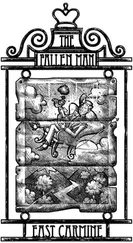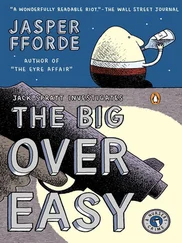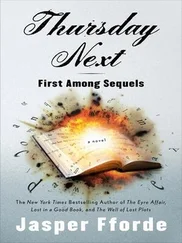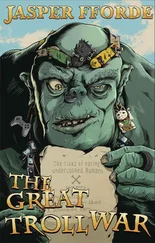‘What Dreams May Come,’ I said.
‘Happy snap?’ said the photographer. ‘Proper tidy you’ll look and as—’
‘—reasonably priced as they come?’ I said. ‘Was that what you were going to say?’
‘Well, yes,’ said the photographer, looking at Birgitta, who shrugged. I knew that I was now leading the dream, and not just being a passenger within it.
‘We’ve not much time,’ I said, feeling the shadow of the blue Buick dream fast approaching our beach idyll. ‘I want to see more of you and me, away from the beach. When and where did we meet for the last time?’
The smile dropped from her face.
‘You don’t need me to tell you, Charlie, you already know.’
It was true, I did. It was in the Cambrensis , a week prior to Slumberdown, three years before. But just then, the little girl approached with the beach ball and the gurgle of laughter but she didn’t pass by this time; she stopped and stared at me.
‘Be careful, Charlie,’ she said. ‘If you look into someone else’s dreams, all you ever find are nightmares.’
And she ran off with her beach ball.
I readied myself, then jumped to another dream, a dream-within-the-dream. I didn’t know I was able to do this, but I could. Like finding you can play the piano when you’re eighteen but somehow you always knew – astonishing and expected, all at the same time.
I was outside a dark, cheerless Dormitorium, dismal and forbidding in age-darkened stone. The dream, like the dream I’d just left, was hyper-realistic, distinguishable from reality only because I knew it wasn’t. I’d seen this building before, out in the real world. It was the Geraldus Cambrensis .
I caught a glimpse of my reflection in the glazed panel of the door and saw Charlie Webster staring back at me. He looked harder, more weary, older, stressed. I pushed open the door, wondering where my subconscious was taking me.
The style of the interior was from the thirteenth century, when only the clergy and aristocracy used Dormitoria and slumber was inextricably linked with death, renewal and religion. A curved staircase led up behind the lobby towards the central void, but modern sofas were positioned either side of the central desk, where the porter was doing some paperwork. Zsazsa was reading a copy of the Ludlow Vogue while sitting on one of the sofas, while on the other I could see Agent Hooke partially hidden behind a newspaper. There was a third figure in a phone booth to one side, which looked as though it was either Aurora or Toccata, but impossible to say which.
‘Good evening,’ said the porter.
‘Good evening,’ I replied. ‘Any messages?’
The Consul Charlie part of me didn’t know him, but the Birgitta’s Charlie part of me did.
‘Just one,’ he replied, and handed me a note from my pigeonhole.
There will always be the Gower
It wasn’t the porter’s writing. It was Birgitta’s, and meant only one thing: they were on to me, and I should get to the safe house without delay, stay quiet, await instructions.
I thanked the porter, turned, but instead of making my escape as Birgitta had suggested, I trotted up the stairs to the first floor. I heard the rustle of a newspaper being folded and footsteps on the stone floor below, but I did not quicken my pace. If I could hear Agent Hooke, he would be able to hear me.
The building was demonstrably ancient, gloomy and in a poor state of repair. Buckets had been scattered around to catch the leaks in the vaulted corridor, and large blooms of mould had erupted across the damp plaster. I moved on around the curved corridor, entered room 106 and cautiously locked the door behind me.
The room was not large, had an arched ceiling rendered in plaster and was panelled in pine linenfold, some of which had been repaired poorly, and in haste. There was a single sash window which opened on to a fire escape and, upon the wall, a clock set inside a multi-spiked star with its hands frozen at 10.55. There were no books, no personal ornaments, no pictures, no photographs. Webster seemed to me either a man without a past, or a man eager not to have one.
Without thinking, I reached into the leather satchel slung from my shoulder, and removed a round cardboard tube of the sort used to carry music or Dictaphone cylinders. It was the recording cylinder that I’d been told to get to Kiki. But I didn’t know who Kiki was, nor how to get it there, nor where I’d got it. I was part Charles Webster, not all of him; I was only witnessing a small window into his life. I crossed to the fireplace and pushed the cylinder onto a handy ledge high up inside the chimney. This done, I took a match to the note the porter had given me and watched it burn to ash.
I was just beginning to wonder when Birgitta would turn up when – predictably enough, given this was my dream – there was a tap on the window, and I saw her wave at me from the fire escape outside. But she wasn’t the Birgitta from the beach, it was a serious Birgitta, a late-season Birgitta, a bulked-up-make-baby-in-the-Spring Birgitta, a worried Birgitta – and not, I think, for herself.
‘For God’s sake, Charlie,’ she said when I opened the window and helped her climb in, ‘didn’t the porter show you my note?’
But at least she was there, even if pissed off. Her dark hair was loosely bunched up in a ponytail, and beneath her parka she was dressed in paint-spattered dungarees.
‘I did get your note,’ I said, going along with the narrative, enjoying the frisson of danger. I’d seen the Cambrensis in the distance, knew where Webster had lived; I’d seen his address on file. I was filling in the gaps. This was a dream to be savoured, an experience to enjoy. The adventure was wholly in my head, and I was going to enjoy every moment.
‘Then why didn’t you go to the safe house?’ she continued, her anger rooted more in concern than annoyance. ‘Kiki would have arranged your evacuation.’
The dream was becoming more like a spy thriller by the second: Birgitta and I were not in the Douzey as economic migrants. We were engaged in infiltration work for the Campaign for Real Sleep. I was in deep cover at HiberTech, working my way up the unskilled labour chain to gain access to sensitive information.
‘I’m just an orderly. I’ll act dumb. They’ve got nothing.’
‘Not this time. She was there, in the phone booth, when I walked in. She knows .’
I didn’t know what I was meant to say right then, but it was okay; Birgitta spoke for me. And when she did, it was pretty much as expected.
‘Kiki needs the cylinder.’
Of course. She would say that. I was still filling in the blanks with whatever was to hand. I’d said it before: a dream is just the subconscious mind attempting to form a narrative from a jumble of thoughts, facts and memories.
‘It’s safe,’ I said, meaning the tube I’d just hidden up the chimney, ‘and I’ll come back for it, I promise – and get it to Kiki.’
She raised an eyebrow.
‘I’m not leaving Sector Twelve until you do.’
There was a thump on the door. It was expected, but we jumped, even so.
‘Webster?’ came a voice that could have belonged to either Toccata or Aurora.
‘Who’s there?’ I asked in an innocent, sing-song sort of way.
‘Who do you think?’ came the voice again. ‘The Gronk? Open the sodding door.’
Birgitta and I looked at one another.
‘They’ll search the place,’ I whispered, ‘there must be nothing linking you and me. Here.’
I reached up and plucked a faded photo from where it was hidden beneath the star-shaped clock. It was the Polaroid of us both, a wafer of time from that perfect and now distant moment back on the Rhosilli. I handed it to Birgitta.
Читать дальше












